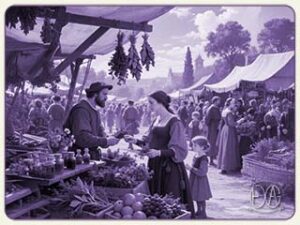Reflexiones sobre lo silvestre, lo olvidado y el comercio circular 🌍
[Deutsch unten] [English below]
Hoy me encontraba viendo una breve pero inspiradora entrevista con Ben, de BTC-Sessions 🎥, un creador cuya perspectiva siempre me invita a pensar más allá de lo evidente en el ámbito de Bitcoin. Mientras escuchaba sus palabras, mi mente volvió a algo que me fascina: las plantas y frutos silvestres que nos rodean, esos tesoros naturales que crecen espontáneamente en nuestros bosques, montañas y prados 🌳.
Con frecuencia me detengo a observarlos, a aprender de ellos y a preguntarme por qué no están presentes en los mercados convencionales 🛒. ¿Dónde quedaron los sabores auténticos, los aromas salvajes y las propiedades medicinales de especies como las Bayas de saúco, la Mora silvestre, el Ajenjo, la Grosella negra, la Ciruela mirabel, el Espino amarillo, las Bayas de enebro o los deliciosos Arándanos azules? 🍇🍓 ¿Por qué estos productos, tan ricos en nutrientes y arraigados a nuestra tierra, han sido relegados al olvido en favor de alimentos procesados y uniformes 🍔?
 La respuesta, sospecho, tiene múltiples capas. Por un lado, está la desconexión moderna con la naturaleza 🌱, esa brecha cada vez más amplia entre el ser humano y su entorno. Pero también existe una dinámica económica que prioriza lo industrializado, lo escalable y lo fácilmente comercializable 💰. En este contexto, el comercio circular —esa idea ancestral de intercambiar bienes locales y sostenibles♻️— parece haberse desvanecido. Sin embargo, creo firmemente que herramientas como Bitcoin 💻, cuando se utilizan con responsabilidad, podrían revitalizar este tipo de economías descentralizadas, devolviéndonos parte de nuestra soberanía alimentaria 🍎.
La respuesta, sospecho, tiene múltiples capas. Por un lado, está la desconexión moderna con la naturaleza 🌱, esa brecha cada vez más amplia entre el ser humano y su entorno. Pero también existe una dinámica económica que prioriza lo industrializado, lo escalable y lo fácilmente comercializable 💰. En este contexto, el comercio circular —esa idea ancestral de intercambiar bienes locales y sostenibles♻️— parece haberse desvanecido. Sin embargo, creo firmemente que herramientas como Bitcoin 💻, cuando se utilizan con responsabilidad, podrían revitalizar este tipo de economías descentralizadas, devolviéndonos parte de nuestra soberanía alimentaria 🍎.
Pero, más allá de las posibilidades tecnológicas, me pregunto: ¿qué ha pasado con nuestra curiosidad y nuestro instinto natural de explorar y aprovechar los recursos que la tierra nos ofrece? 🤔 ¿Están siendo suprimidos estos conocimientos ancestrales, o es que la gente simplemente ha perdido el interés? Vivimos en una era donde el foco está puesto en soluciones rápidas: un analgésico para el dolor 💊, una aspirina para el malestar, una vacuna para prevenir enfermedades 💉. No niego la importancia de la medicina moderna, pero ¿cuándo fue la última vez que alguien recurrió a una infusión de Ajenjo para aliviar dolencias? 🌿 ¿O que valoró el poder antioxidante del Espino amarillo como alternativa natural?
Es preocupante pensar que muchas de estas plantas y frutos no solo han desaparecido de los mercados, sino también de nuestra conciencia colectiva 🚫. Tal vez sea hora de replantearnos nuestras prioridades y redescubrir el valor de lo que la naturaleza pone a nuestro alcance 🌼. Después de todo, la verdadera riqueza no está en lo que podemos comprar, sino en lo que podemos cultivar, compartir y preservar 🌎💚.
🔗 Entrevista-Post de referencia
Reflexionen über das Wilde, das Vergessene und die Kreislaufwirtschaft 🌿
Heute ertappte ich mich dabei, wie ich ein kurzes, aber inspirierendes Interview mit Ben von BTC-Sessions 🎥 ansah, einem Kreativen, dessen Perspektive mich immer dazu anregt, über das Offensichtliche hinaus zu denken, wenn es um Bitcoin geht. Während ich seinen Worten lauschte, schweiften meine Gedanken zurück zu etwas, das mich fasziniert: die wilden Pflanzen und Früchte, die uns umgeben – jene natürlichen Schätze, die spontan in unseren Wäldern, Bergen und Wiesen wachsen 🌳.
Ich halte oft inne, um sie zu beobachten, von ihnen zu lernen und mich zu fragen, warum sie auf den herkömmlichen Märkten fehlen 🛒. Wo sind die authentischen Aromen, die wilden Düfte und die heilenden Eigenschaften von Arten wie Holunderbeeren, Brombeeren, Beifuß, Johannisbeeren, Mirabellen, Sanddorn, Preiselbeeren und Heidelbeeren geblieben? 🍇🍓 Warum wurden diese nährstoffreichen Produkte, die so tief in unserer Erde verwurzelt sind, zugunsten von verarbeiteten und uniformen Lebensmitteln in Vergessenheit geraten 🍔?
 Die Antwort, vermute ich, hat viele Schichten. Einerseits gibt es die moderne Entfremdung von der Natur 🌍, diese immer größer werdende Kluft zwischen dem Menschen und seiner Umwelt. Aber es gibt auch eine ökonomische Dynamik, die das Industrialisierte, das Skalierbare und das einfach Vermarktete priorisiert 💰. In diesem Kontext scheint die Kreislaufwirtschaft – jene uralte Idee des Austauschs lokaler und nachhaltiger Güter ♻️– verblasst zu sein. Doch ich glaube fest daran, dass Werkzeuge wie Bitcoin 💻, wenn sie verantwortungsbewusst genutzt werden, diese Art dezentraler Wirtschaft wiederbeleben könnten, indem sie einen Teil unserer Ernährungssouveränität zurückgewinnen 🍎.
Die Antwort, vermute ich, hat viele Schichten. Einerseits gibt es die moderne Entfremdung von der Natur 🌍, diese immer größer werdende Kluft zwischen dem Menschen und seiner Umwelt. Aber es gibt auch eine ökonomische Dynamik, die das Industrialisierte, das Skalierbare und das einfach Vermarktete priorisiert 💰. In diesem Kontext scheint die Kreislaufwirtschaft – jene uralte Idee des Austauschs lokaler und nachhaltiger Güter ♻️– verblasst zu sein. Doch ich glaube fest daran, dass Werkzeuge wie Bitcoin 💻, wenn sie verantwortungsbewusst genutzt werden, diese Art dezentraler Wirtschaft wiederbeleben könnten, indem sie einen Teil unserer Ernährungssouveränität zurückgewinnen 🍎.
Aber jenseits technologischer Möglichkeiten frage ich mich: Was ist mit unserer Neugier und unserem natürlichen Instinkt passiert, die Ressourcen zu erkunden und zu nutzen, die uns die Erde bietet? 🤔 Werden diese alten Kenntnisse unterdrückt, oder hat die Menschen einfach das Interesse verloren? Wir leben in einer Ära, in der der Fokus auf schnelle Lösungen gerichtet ist: ein Schmerzmittel gegen Unwohlsein 💊, ein Aspirin bei Beschwerden, ein Impfstoff zur Vorbeugung von Krankheiten 💉. Ich bestreite nicht die Bedeutung der modernen Medizin, aber wann hat sich zum letzten Mal jemand einer Artemisia-Tinktur bedient, um Beschwerden zu lindern? 🌿 Oder den antioxidativen Wert von Sanddorn als natürliches Heilmittel geschätzt?
Es ist beunruhigend zu denken, dass viele dieser Pflanzen und Früchte nicht nur aus den Märkten, sondern auch aus unserem kollektiven Bewusstsein verschwunden sind 🚫. Vielleicht ist es an der Zeit, unsere Prioritäten neu zu überdenken und den Wert dessen wiederzuentdecken, was uns die Natur bietet 🌼. Denn letztlich liegt der wahre Reichtum nicht darin, was wir kaufen können, sondern darin, was wir kultivieren, teilen und bewahren können 🌎💚.
Reflections on the Wild, the Forgotten, and the Circular Economy 🌱
Today, I found myself watching a brief yet inspiring interview with Ben from BTC-Sessions 🎥, a creator whose perspective always encourages me to think beyond the obvious when it comes to Bitcoin. As I listened to his words, my mind wandered back to something that fascinates me: the wild plants and fruits that surround us, those natural treasures that grow spontaneously in our forests, mountains, and meadows 🌲.
I often pause to observe them, to learn about them, and to wonder why they are absent from conventional markets 🛒. Where have the authentic flavours, the wild aromas, and the medicinal properties of species like Elderberry, Blackberry, Artemisia, Blackcurrant, Mirabelle plum, Sea Buckthorn, Cranberry, and Blueberry gone? 🍇🍓 Why have these nutrient-rich products, so deeply rooted in our land, been pushed into obscurity in favour of processed and uniform foods 🍔?
 The answer, I suspect, has many layers. On one hand, there is the modern disconnection from nature 🌍, that ever-widening gap between humans and their environment. But there is also an economic dynamic that prioritises the industrialised, the scalable, and the easily marketable 💰. In this context, the circular economy — that ancient idea of exchanging local and sustainable goods ♻️— seems to have faded away. However, I firmly believe that tools like Bitcoin 💻, when used responsibly, could revitalise this type of decentralised economy, restoring some of our food sovereignty 🍎.
The answer, I suspect, has many layers. On one hand, there is the modern disconnection from nature 🌍, that ever-widening gap between humans and their environment. But there is also an economic dynamic that prioritises the industrialised, the scalable, and the easily marketable 💰. In this context, the circular economy — that ancient idea of exchanging local and sustainable goods ♻️— seems to have faded away. However, I firmly believe that tools like Bitcoin 💻, when used responsibly, could revitalise this type of decentralised economy, restoring some of our food sovereignty 🍎.
But beyond technological possibilities, I wonder: what has happened to our curiosity and our natural instinct to explore and make use of the resources the Earth provides? 🤔 Are these ancestral knowledges being suppressed, or has people simply lost interest? We live in an era where the focus is on quick fixes: a painkiller for discomfort 💊, an aspirin for ailments, a vaccine to prevent disease 💉. I do not deny the importance of modern medicine, but when was the last time someone turned to an Artemisia infusion to relieve their ailments? 🌿 Or valued the antioxidant power of Sea Buckthorn as a natural alternative?
It is concerning to think that many of these plants and fruits have disappeared not only from the markets but also from our collective consciousness 🚫. Perhaps it is time to rethink our priorities and rediscover the value of what nature offers us 🌼. After all, true wealth is not in what we can buy, but in what we can cultivate, share, and preserve 🌎💚.
Rediscovering Wild Plants – 09/02/25
General information: Please consider that everything shown on this post it is a purely personal work, which implies full free and artistic expression in the content. By clicking on any of the links, buttons, etc. that constitute it, even the complete website, you will be accepting this. If you are looking for censorship, centralisation, control, cruelty or something similar, there are recognised websites familiar with these last mentioned topics and feel free to close this site immediately.
Did you like the post? Share it with your friends!
